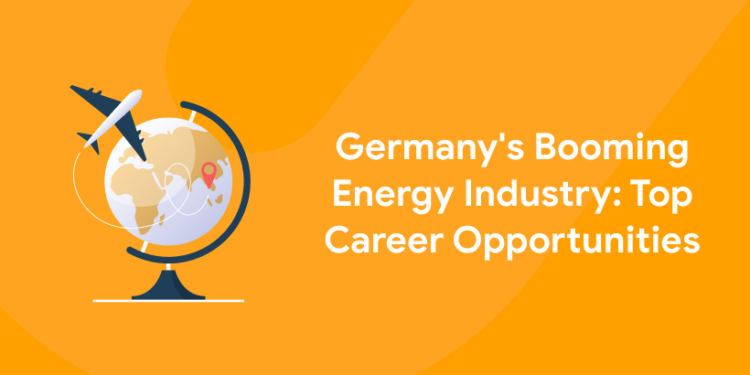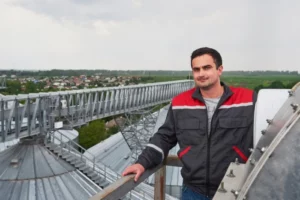Table of Contents
Key Takeaways:
- 2026 is poised to be a landmark year for energy careers in Germany, driven by ambitious climate goals and large-scale renewable energy projects.
- The highest demand is for wind, solar, battery storage, and data roles, with international professionals welcomed.
- Salaries and job flexibility are increasing, with opportunities available to vocational graduates and STEM professionals.
- Learning German improves employability, salary, and integration; Entri’s course is a recommended pathway.
- Schengen visa privileges and progressive work culture transform working in Germany into an exceptional lifestyle experience.
Introduction
Germany’s energy industry is undergoing a transformation that’s capturing global attention. If you’re dreaming of a future where your work powers a more sustainable planet—and boosts your bank account—2026 might be your year to shine in Germany’s forward-thinking energy sector.
But beyond impressive salary brackets and technical innovations, Germany’s “Energiewende” isn’t just policy—it’s a movement that’s creating human stories. Meet the international graduates working on wind farms overlooking Bavarian lakes, data analysts optimizing solar grids in Hamburg, and sustainability managers finding their work-life balance with weekend trips across Europe. This blog reveals current facts, future trends, and powerful advice for anyone eager to seize career opportunities in Germany’s energy revolution.
Overview of Germany’s Energy Industry
1: How do you say "Good Morning" in German?
Germany’s energy sector is a powerhouse of innovation and ambition. The country has committed to sourcing 80% of its electricity from renewables by 2030 and achieving climate neutrality by 2045. In 2024, renewables generated a record 59% of Germany’s total power, with wind and solar leading the charge. [1] The market is set to grow from 182.96 gigawatts in 2025 to 259.86 gigawatts by 2030, reflecting the rapid expansion of wind, solar, hydro, and bioenergy projects. [2]
This transition is not only transforming the energy mix but also creating thousands of new jobs each year. The proportion of advertised jobs related to the energy transition rose from 1.8% to 3.8% between 2019 and 2024,[3] with over 372,500 energy transition job postings in 2024 alone. Despite economic challenges, the sector has proven resilient, with solar energy job postings increasing from 41,500 in 2019 to 102,000 in 2024, and wind energy jobs rising by 70%. [4]
You might also like: Top Industries and Career Opportunities in Germany
Free German A1 Mock Tests – Powered by AI!
Test your skills on our interactive platform. Get instant feedback from our AI to help you communicate better and track your progress. Start your free German mock test now.
Test Your German A1 for FreeKey Growth Areas in 2026
The energy sector in Germany is expanding across multiple fronts. Wind and solar energy remain the dominant growth areas, with Germany aiming to install 145 gigawatts of wind capacity by 2030—second only to China and the US. Offshore wind farms are a particular focus, with plans to reach 20 gigawatts of installed capacity by 2030. [2]
Solar energy is also experiencing explosive growth, with Germany installing more than 15 gigawatts of new solar capacity in 2023 alone, doubling the previous year’s figure. The country is on track to exceed its 2024 solar target, with over 100,000 solar panels installed daily. [1]
Other growth areas include battery storage, hydrogen technology, smart grids, and sustainable infrastructure. These sectors are crucial for integrating renewables into the grid, ensuring stability, and supporting the transition to a low-carbon economy.
In-Demand Job Roles in 2026
The energy transition is creating a wide range of job opportunities across Germany. Key roles include:
- Wind Turbine Technicians: Responsible for the installation, maintenance, and repair of wind turbines. With rapid expansion of wind farms, demand for skilled technicians is soaring. (Read in detail here)
- Solar Panel Installers: Involved in the installation and maintenance of solar panels. The surge in solar capacity is driving demand for qualified installers. (Read in detail here)
- Energy Analysts: Use data to optimize energy systems, improve efficiency, and support grid stability. These roles are critical for managing the complexities of a renewable-powered grid. (Read in detail here)
- Environmental Engineers: Focus on sustainability, environmental impact assessments, and compliance with regulations. Their expertise is essential for ensuring that energy projects meet environmental standards. (Read in detail here)
- Battery Storage Specialists: Work on developing and managing energy storage solutions, which are vital for balancing supply and demand in a renewable-powered grid. (Read in detail here)
- Hydropower Technicians: Involved in the operation and maintenance of hydroelectric power plants. Hydropower is a stable and reliable source of renewable energy. (Read in detail here)
Required Skills and Educational Background
To succeed in Germany’s energy sector, professionals need a combination of technical and soft skills. Core technical skills include
- Engineering
- Mechatronics
- Data analysis
- Project management
Familiarity with digitalization tools such as AI, IoT, and smart grid technologies is increasingly important.
Educational backgrounds in engineering, environmental science, and data analytics are highly valued. Vocational training and international certifications are also recognized and can enhance employability. Upskilling through short courses and learning German can significantly boost career prospects.
Also read: What Level of German is Required to Work in Germany?
Free German A1 Mock Tests – Powered by AI!
Test your skills on our interactive platform. Get instant feedback from our AI to help you communicate better and track your progress. Start your free German mock test now.
Test Your German A1 for FreeExpected Salaries and Benefits
Salaries in Germany’s energy sector are competitive and reflect the high demand for skilled professionals. Entry-level roles typically start around €35,000 per year, while experienced engineers and analysts can earn upwards of €50,000–€70,000. Top roles in project management and leadership can exceed €80,000 annually.
Benefits include flexible working hours, robust mentorship programs, union protections, and transparent career paths. Many companies offer relocation support, language courses, and family-friendly policies, making Germany an attractive destination for international professionals.
| Job Role | Entry-Level (EUR/year) | Mid-Career (EUR/year) | Senior/Expert (EUR/year) | Notes |
|---|---|---|---|---|
| Wind Turbine Technician | 38,000 | 45,000 | 50,000 | High demand due to wind farm expansion |
| Solar Panel Installer | 30,000 | 35,000 | 40,000 | Rapid solar capacity growth |
| Energy Analyst | 51,080 | 60,000 | 68,060 | Data-driven, grid optimization roles |
| Environmental Engineer | 50,000 | 60,000 | 70,000 | Sustainability and compliance focus |
| Battery Storage Specialist | 45,000 | 55,000 | 65,000 | Key for grid stability and storage |
| Hydropower Technician | 35,000 | 40,000 | 45,000 | Modernization of hydro systems |
| Project Manager (Energy) | 60,000 | 75,000 | 85,000+ | Leadership, cross-functional roles |
Notes: – Salaries can vary by region, company size, and experience level. – Additional benefits like bonuses, relocation support, and health insurance are common in most energy sector roles. – German language proficiency often increases salary potential and job access, especially in senior and managerial positions.
People also read: Salary Guide for Germany
|
German A2 Exercises – Download Free PDF |
||
Top Employers and Hiring Regions
Germany’s energy sector is home to some of the world’s leading companies. Key employers include
- RWE AG
- BayWa r.e.
- EnBW AG
- Siemens Gamesa
- ABO Energy
- Nordex
- Enercon
- BASF Renewable Energy
These companies are at the forefront of renewable energy innovation and offer a wide range of career opportunities.
Major job hubs include
- North Rhine-Westphalia (wind, battery)
- Bavaria (solar, infrastructure)
- Hamburg (smart grids, offshore wind)
- Berlin (policy, innovation)
- Baden-Württemberg
These regions offer a mix of urban and rural opportunities, with vibrant multicultural communities and modern infrastructure.
Work Culture and Lifestyle
The German culture is known for its punctuality, direct communication, and commitment to quality. Most companies support flexible working hours, offer robust mentorship, and provide transparent career paths. Union protections and family-friendly policies ensure a healthy work-life balance. [5]
Expat professionals appreciate the integration programs, relocation support, and language courses offered by many employers. Germany’s vibrant multicultural communities, modern infrastructure, and strong social safety net make it an attractive destination for international talent.
Schengen Visa Benefits
With a German work visa or EU Blue Card, professionals enjoy freedom of travel across 27 European countries. This allows for weekend getaways to Paris or Prague, international networking, and exposure to European markets. Family reunification policies and fast-track residency programs guarantee long-term settlement and opportunity.
|
Goethe Exam Dates: Multiple Test Centers |
|
| Trivandrum Goethe Exam Dates | Kochi Goethe Exam Dates |
| Chennai Goethe Exam Dates | Coimbatore Goethe Exam Dates |
Future Outlook for 2030 and Beyond
Germany’s energy sector is not just growing—it’s setting the pace for the future. By 2030, the country plans to get 80% of its electricity from renewable sources, with climate neutrality as the ultimate goal by 2045. This isn’t just about hitting targets; it’s about building a greener, smarter, and more sustainable world.
Here’s what the future holds for energy professionals in Germany:
- Renewables will keep expanding: Wind and solar power will continue to dominate, with offshore wind farms and massive solar installations popping up across the country.
- Hydrogen will be a game-changer: Green hydrogen is set to revolutionize industries like steel, chemicals, and transportation, creating exciting new roles for engineers and project managers.
- Energy storage and smart grids will be in high demand: As more renewable energy comes online, advanced battery storage and smart grid technologies will be essential for keeping the lights on and the system stable.
- Digital innovation will shape the sector: AI, IoT, and real-time data analytics will become everyday tools for optimizing energy systems and managing the grid.
- Sustainable infrastructure will grow: Buildings, transport, and industry will rely on integrated, digital energy solutions, opening up new opportunities for engineers, data analysts, and business managers.
- The sector will keep hiring: Germany’s commitment to sustainability means there will be steady demand for skilled professionals, from entry-level technicians to experienced project leaders.
- Continuous learning will be key: The energy industry is evolving fast, so staying up-to-date with new technologies and regulations will be crucial for career growth.
Germany’s energy sector is more than just a job market—it’s a movement. Whether you’re just starting or looking to advance your career, the future is bright for those ready to power the green revolution.
How Learning German Can Boost Your Career
German language proficiency is a significant advantage in the energy sector. While some technical roles accept English, German skills open up more job opportunities, higher salaries, and better integration. Entri’s German Language Course covers A1–C2, Goethe exam prep, themed lessons, live sessions, and placement help. The course is designed for professionals, with industry-specific language modules and everyday speaking practice. Learning Deutsch is a game-changer for networking and job interviews in the energy sector.
Conclusion
Germany’s energy industry is evolving rapidly—and the doors are wide open for talented, driven professionals from all over the world. If you want a rewarding, future-proof career, stable income, and the chance to make a real impact, 2026 is your time to claim your place in Germany’s green revolution. Ready to power your own journey? Start learning German, polish your technical skills, and watch your European career take off.
For those eager to maximize their opportunities, don’t wait—explore Entri’s German Language Course today and get industry-ready for Germany’s booming energy sector.
References
- Germany Sets New Record for Renewable Power (Ember)
- Germany Renewable Energy Market Size and Share Analysis (Mordor Intelligence)
- Share of Job Offers in Renewable Sector Increased Despite Economic Crises (Clean Energy Wire)
- Germany’s Green Jobs Double but Staff Shortage threatens Growth, Study Shows (Reuters)
Free German A1 Mock Tests – Powered by AI!
Test your skills on our interactive platform. Get instant feedback from our AI to help you communicate better and track your progress. Start your free German mock test now.
Test Your German A1 for FreeFrequently Asked Questions
What are the most in-demand energy jobs in Germany for2026?
The top roles include Wind Turbine Technicians, Solar Panel Installers, Energy Analysts, Environmental Engineers, Battery Storage Specialists, and Hydropower Technicians. These positions are growing fast due to Germany’s push for renewables and grid modernization.
Do I need to know German to work in Germany’s energy sector?
While some technical roles accept English, knowing German gives you a major advantage. It opens up more job opportunities, helps with integration, and can boost your salary. For most non-technical and managerial roles, German is essential.
How much can I expect to earn in the energy sector in Germany?
Entry-level salaries typically start around €35,000 per year. With experience, professionals can earn €50,000–€80,000 or more, especially in engineering, analytics, and project management roles.
What qualifications do I need for energy jobs in Germany?
Most roles require a background in engineering, environmental science, or data analytics. Vocational training and international certifications are also valued. Upskilling with courses in digital energy, sustainability, or German language is highly recommended.
Can international professionals easily get jobs in Germany’s energy sector?
Yes! Germany welcomes skilled workers through streamlined visa programs like the Skilled Worker Visa and EU Blue Card. Many companies support relocation and integration, making it easier for foreigners to start their careers.
What are the best regions in Germany for energy jobs?
Key hubs include North Rhine-Westphalia (wind, battery), Bavaria (solar, infrastructure), Hamburg (smart grids, offshore wind), Berlin (policy, innovation), and Baden-Württemberg. These regions offer vibrant communities and strong industry networks.
How does the Schengen visa benefit energy professionals in Germany?
With a German work visa or EU Blue Card, you can travel freely across27 European countries. This makes it easy to explore new opportunities, network, and enjoy a European lifestyle.
What’s the work culture like in Germany’s energy sector?
German companies are known for their punctuality, direct communication, and commitment to quality. Most offer flexible hours, strong mentorship, and family-friendly policies, making it a great environment for international professionals.
How can I prepare for a career in Germany’s energy industry?
Focus on building technical skills, learning German, and gaining relevant certifications. Online courses, vocational training, and networking through industry events can help you stand out.
Is the energy sector in Germany future-proof?
Absolutely! With ambitious climate goals and continuous investment in renewables, digitalization, and sustainable infrastructure, the sector is set for long-term growth and stability.















